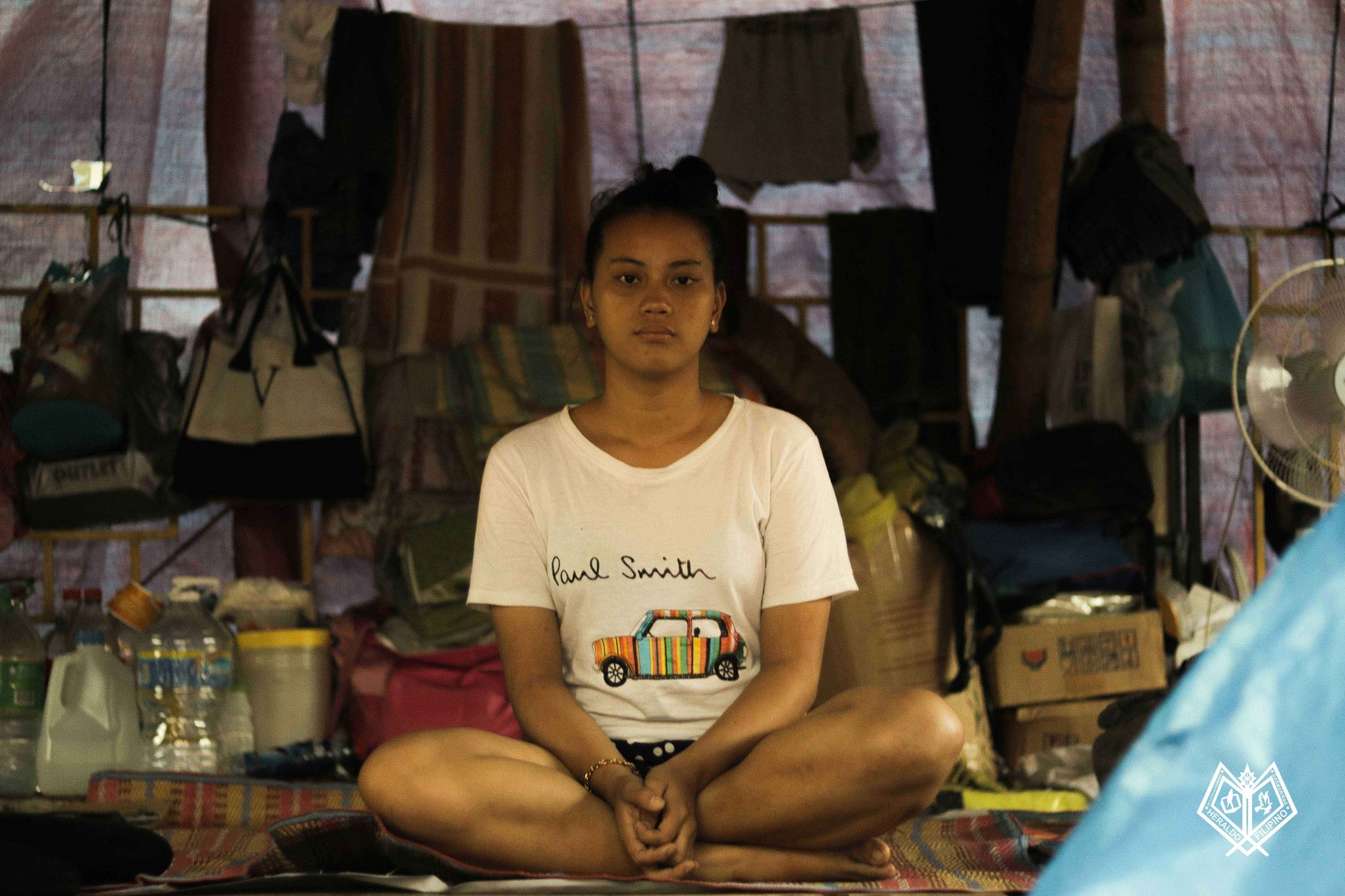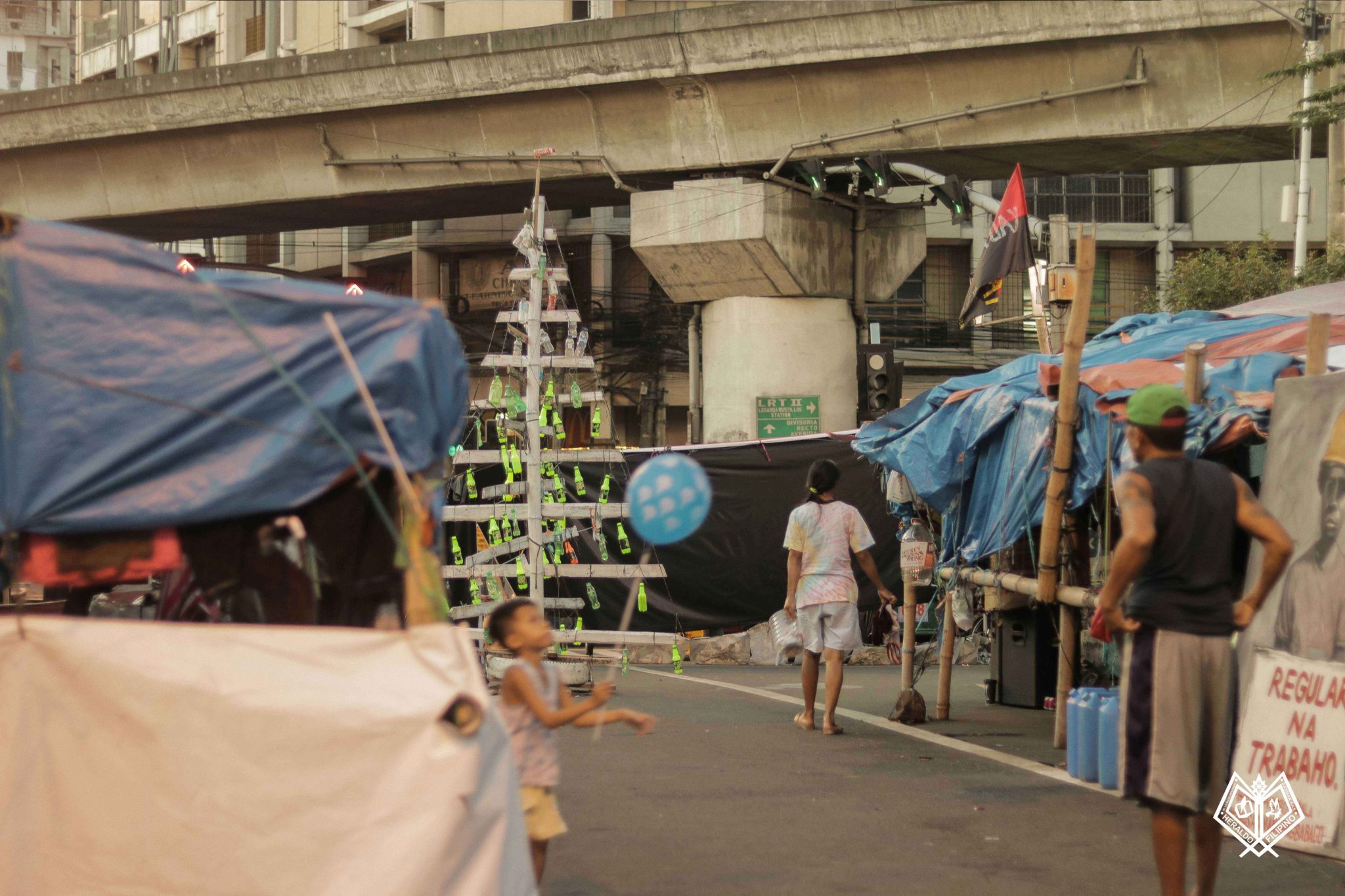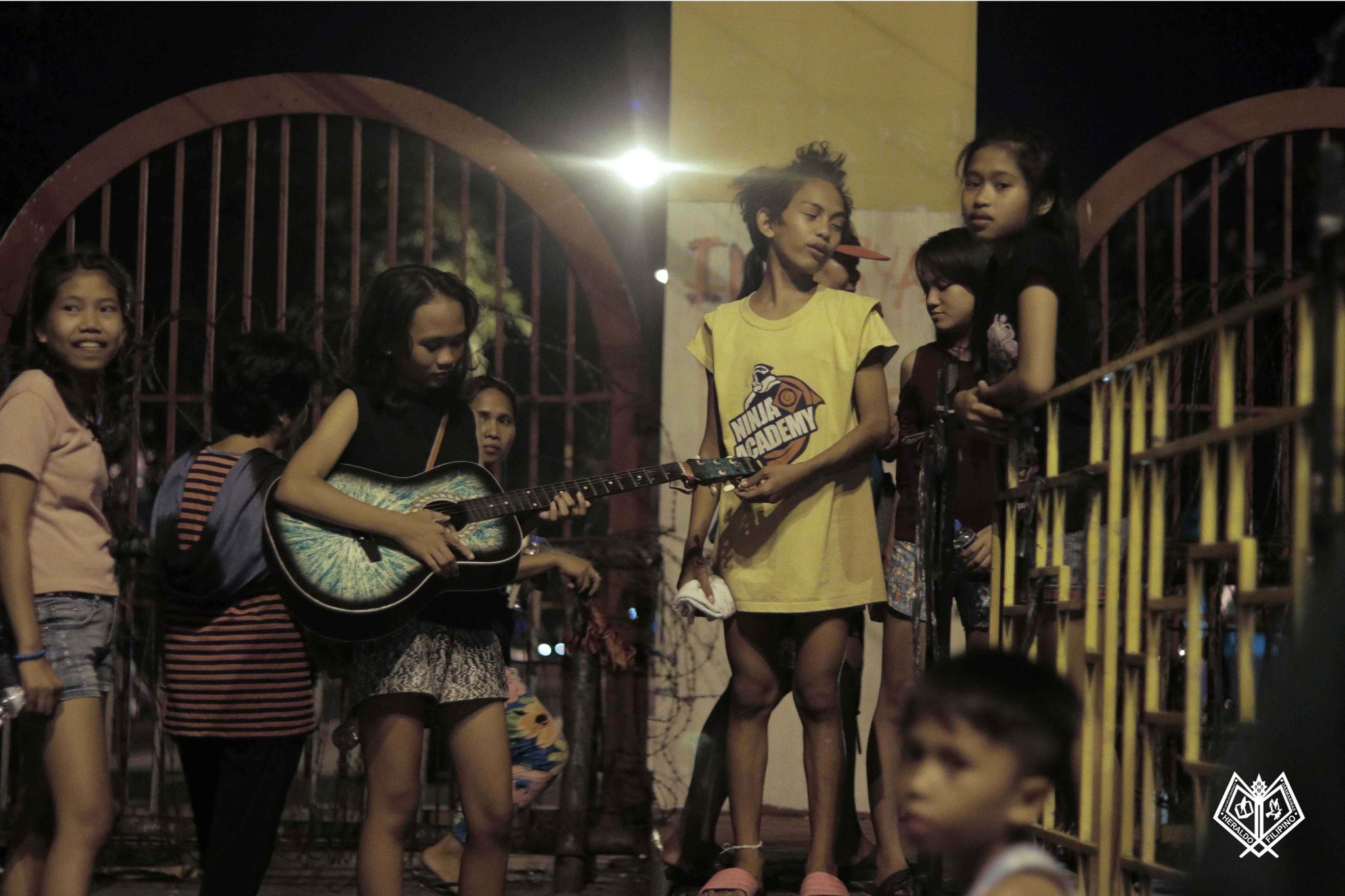Won’t be home for Christmas

Photo by: Justine Bea Baustista
“Ako, noong umpisa, malakas lang kasi talaga ang loob ko. Pero noong nangyari ‘yong demolition, hindi mo rin maalis sa sarili mo na manghina ka kasi [mapapatanong ka] ‘nasaan na ‘yong pinaglalaban niyo?’” Joyce Tenerife narrates. She is only one among many who will be spending Christmas and the holiday season along Mendiola street this year.
They have been there for two months now—under tents made of sailcloth and old bamboos. In the middle of their makeshift homes, the families have built a “krisis-mas” tree symbolizing their outcry to the government as they wait for better things to happen.
This is Christmas for Joyce. But before everything, it has been a nightmare.

Photo by: Justine Bea Baustista
The demolition
On October 19 earlier this year, Joyce, a Grade 10 student, went home from school in time to see the dust settle. Of all the tests she faced that day, she said this one was the hardest.
More than 2,000 families were moved off the slum in the East Bank of Manggahan Floodway, Sta. Lucia village in Pasig City. It was in compliance with the December 18, 2008 Mamndamus order of the Supreme Court directing “easements.”
The area had been a war zone that intensified on August of the same year as the opposition from the residents took a tense—sometimes chaotic—turn. Since then, the setting was what Joyce had lived through. But it wasn’t easy holding on to their home for 26 years, as it also meant battling with the police, the clubs, and the firetrucks.
The ordeal
Every morning was as difficult as it could be. Only in that morning of August 31st did it ever become too much.
Joyce believes she shouldn’t turn her back from the rage of the demolition raid, especially since the police had promised there’d be no such operation.
“Sa part namin, walang gumagalaw. Ang gusto lang talaga namin, mapaalis ‘yong pulis kasi sabi nila, wala raw demolition. Pero ang aga [pa] noon, maraming nang mga pulis at mga SWAT (Special Weapons And Tactics). Ang gusto namin, makipag-usap sa mga chief na hangga’t `di sila umaalis,`di kami aalis.”
Later on that day, Pasig City Police Station chief Senior Superintendent Orlando Yerba clarified that no demolition happened despite the residents staging a rally.
“Gusto ko maging lawyer—para sa pamilya o sa mga trabahador”
“Nagbomba na sila ng tubig. Sa part namin, may gumanti na. Dalawang bumbero `yon eh. Tapos mayroong truck doon na umatras sa`min. Tinatalian `yong paa namin para pag-andar nila, makakaladkad kami. Tapos may matanda pa kaming kasama—kaya kami, nginatngat na lang namin ‘yong lubid,” Joyce recounts.
On the other hand, Yerba’s account sticks to the story that they didn’t know what exactly the protesters wanted. “Basta lang sila nanggulo at humarang sa kalsada,” he added.
Joyce could only share so much of her traumatic experience, specifically about how a policeman grabbed her by the back of her shirt, pulled her down to the ground, and out to the streets—exposing her body and scratching her back. But she speaks of it as if it wasn’t as bad as it really was.
As a teenager, Joyce is strong for her age. Perhaps that’s a product of all that she’s gone through. But then again, where has being strong taken her so far? Either to a wishful triumph or a straightway to prison.
It was the latter.
On the same day, 31st of August, she thought she had enough.
“Pag-uwi ko, sumilip ako saglit sa pinto namin [sa labas]. Tapos nakita ko ‘yong kuya ko, bigla na lang siyang kinaladkad [ng mga pulis], eh nakatayo lang naman siya. Tapos, hinahampas na siya ng batuta.”
That sight was the last she could handle. When it came to family, she would always come through without any hesitation. At first, her father was able to pull her back as she ran amok toward the police. No one does that to her brother—that was the only thing on her mind.
“Pero hindi ko alam kung saan galing ‘yong lakas ko no’n na parang nahawi ko lang sila. Kasi siyempre, kapatid ko `yon, tapos makikita ko na gano’n-gano’n na lang. Tinulungan ko siyang makatakas.”
At the end of the day, 29 protesters were put in prison for direct assault, illegal assembly, and damage to properties. Yebra said five policemen and firemen were also injured. The protesters included her brothers, sister, mother, and father—her entire family and her too, along with nine other minors. They were held in Bahay Aruga of the Department of Social Welfare and Development. They counted eight days of confinement except on September 1, when they were allowed to see their parents who were also detained.
She spent the rest of the days in Bahay Aruga crying. Seeing her mother alone in handcuffs tore her to the core, how much more could it possibly have agonized her carrying the weight of it all?
The dream
Joyce knows what this life has turned her into. When asked what course she wants to take after senior high school, she answered Law.
“Gusto ko maging lawyer—para sa pamilya o sa mga trabahador,” she said firmly. From there, she shared her disdain for maltreatment to workers.
On the flip side of the devastation that happened during her final exam, she had good grades—she always had good grades. In fact, she even planned to study at the University of the Philippines, if only she didn’t miss taking the UPCAT.
Nevertheless, Joyce is active inside and outside the classroom, plus she’s a C.A.T. officer to boot. For that, and many other reasons, her parents want her to finish her studies as long as they can support her. Of all the things she has on her mind, her education is what she is most optimistic about.
“Siyempre `pag nakikita mo sila na lumalaban pa, mapu-push ka. Kasi karamihan sa`min ang tanong na lang talaga, ‘Hanggang kalian ba kami dito?’
The next thing she is hoping for is for the government to award them the land they fought for. They are one of the families who didn’t bite the relocation program, looking forward to the promised “Home Along the Floodway” project. Joyce quietly hopes this is not another lie, like the P20,000 financial assistance that former chair of Presidential Commission for the Urban Poor (PCUP) Terry Ridon claimed. “Wala naman kaming natanggap eh,” she states.
While waiting for these promises to be fulfilled, her family along with other clans under the support of Anakbayan would have to spend Christmas in the temporary homes they have made.
For her, however, it’s not the season to hold a grudge—not ever. What imbues in her heart most of all is hope. The kind of hope that questions the possibility—but doesn’t deny it.
“Siyempre `pag nakikita mo sila na lumalaban pa, mapu-push ka. Kasi karamihan sa`min ang tanong na lang talaga, ‘Hanggang kalian ba kami dito?’ Kaya minsan, pinapalakas ko na lang din ’yong loob nila, ‘`Di, mag-antay lang tayo,’. Pero `di maiwasan minsan na itanong din sa sarili ko ‘Hanggang kalian nga ba kami dito?’”
As the question remains a mystery for now, Joyce spends the season caroling in the streets with children her age and younger—both to celebrate and to get by. She won’t be home for Christmas today, but someday, she hopes she will—they all will.

Photo by: Justine Bea Baustista





